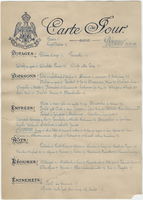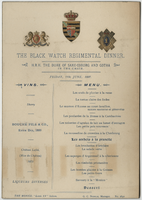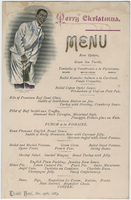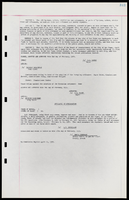Search the Special Collections and Archives Portal
Search Results

Savoy Hotel, lunch menu, October 29, 1898
Date
Archival Collection
Description
Text

Menu for the Black Watch Regimental dinner, Friday, June 11, 1897, The Monico Louis XV saloon
Date
Archival Collection
Description
Text

Christmas menu, December 25, 1883, Lindell Hotel
Date
Archival Collection
Description
Text
Boardwalk Hotel and Casino Records
Identifier
Abstract
The Boardwalk Hotel and Casino Records date from 1993 to 2005 and contain administrative files, gaming projects and systems files, promotional photographs, advertisements, and audiovisual materials pertaining to the Boardwalk Hotel and Casino. The collection also contains material for the Boardwalk under its various names, including the Boardwalk Hotel and Casino, Viscount Hotel, and Holiday Inn Casino Boardwalk.
Archival Collection
Syphus-Bunker Papers
Identifier
Abstract
The Syphus-Bunker Papers date from 1891 to 1994, with the majority of the collection consisting of correspondence between Mary Etta Syphus and John Mathieson Bunker from 1891 to 1895. The collection also contains correspondence from friends and relatives, and documentation related to Mary Etta Syphus' attendance at Brigham Young Academy Church Normal Training School. Other materials include family history information and two color photographs of family homes. The collection also includes typed transcripts of the correspondence.
Archival Collection
Ann Valder Photograph Collection on Judy Bayley
Identifier
Abstract
The Ann Valder Photograph Collection on Judy Bayley (1969-1971) consists of black-and-white photographic prints of Hacienda Hotel owner Judy Bayley, collected by Las Vegas, Nevada journalist Ann Valder. The collection is primarily comprised of photographic prints of Bayley at a 1971 event held in her honor at the International Hotel in Las Vegas, Nevada. The collection also includes photographic prints of Bayley at fundraisers for the American Cancer Society. Ann Valder was an editor and journalist for the
Archival Collection
University of Nevada, Las Vegas Student Engagement and Diversity Records
Identifier
Abstract
The Student Engagement and Diversity Records (approximately 1989-2009) document activities related to the University of Nevada, Las Vegas (UNLV) Student Engagement and Diversity office and its predecessors. Materials include documents and photographs about activities and events such as Premier UNLV, Homecoming, Rebels After Dark, and the Rebel Variety Show.
Archival Collection
Hank Castro Music Business Records and Audio Recordings
Identifier
Abstract
The Hank Castro Music Business Records document Hank Castro's career in the music industry in Las Vegas, Nevada from 1969 to 1990. The bulk of the collection consists of original audio recordings from the Las Vegas Recording Studio. The collection also contains legal documents, personal correspondence, and promotional material related to the Las Vegas Recording Studio (1971-1985), songwriter agreements, and sheet music (the majority of the lyrics written by Hank Castro) from artists represented by the Las Vegas Recording Studio and Castro's other companies.
Archival Collection
Kim Sisters Scrapbooks and Clippings
Identifier
Abstract
The Kim Sisters material date from 1959 to 1966 and 1983. It consists of two scrapbooks and one folder of photocopied materials containing newspaper clippings about the appearances of the Kim Sisters muscial group throughout the United States as well as Italy, Germany, and Spain. It also includes two record album sleeves.
Archival Collection

